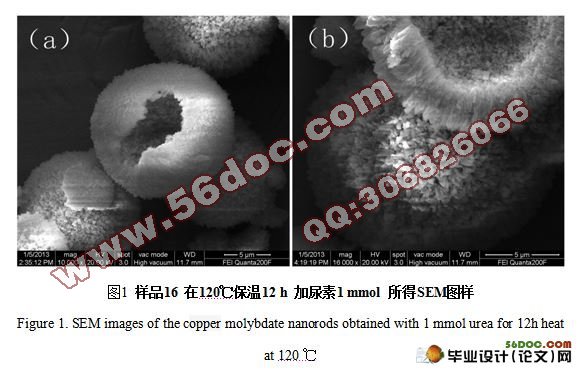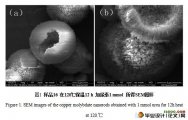钼酸铜的制备及其表征(含任务书,开题报告,外文翻译,毕业论文11900字,答辩PPT)
摘要
本论文主要是使用水热法制备空心球状碱式钼酸铜颗粒。该制备过程受温度、反应时间、尿素的量、以及表面活性剂的强烈影响。以控制单一变量为原则,在恒定的反应时间内,分别改变尿素的量、表面活性剂、温度等影响因子,研究其对微观形貌的变化。通过XRD与扫描电子显微镜对其成分、形貌进行表征后得知:易于在120℃、加热12h、加1mmol尿素、不加表面活性剂条件下选择性控制合成钼酸铜纳米球。并采用微乳液法在120 ℃、加热12 h、加尿素、pvp表面活性剂制备碱式钼酸铜微米球。结果表明水热法和微乳液法是选择性合成大量碱式钼酸铜微米球/微米片的简单方法。
关键词:水热法; 微米球; 微米片; 钼酸盐; 微乳液法
Preparation and Characterization of Copper Molybdate
Abstract
This thesis is to apply the Hydrothermal Synthesis to produce and prepare hollow spherical molybdate copper nanoparticles. The process is strongly influenced by the temperature, reaction time, the amount of urea, and the surface active agent. In accordance with the principle of controlling the single variable, it changes, respectively the amount of urea, surfactant, temperature and other affecting factors, studying its changes on microscopic morphology. After demonstrating its composition and morphology by XRD and scanning electron microscopy, this thesis finds that: it is apt to synthesize molybdate copper nanospheres in the condition of 120 ° C, heating 12h, adding 1mmol urea, and no surfactant conditions. It then applies microemulsion method in the condition of 120 ℃, heating 12h, plus urea, pvp surfactant to produce and prepare molybdate copper nanospheres. The results show that the hydrothermal method and microemulsion method are two simple methods to synthesize selectively a large number of molybdate copper nanoparticles / micron chip.
Keywords: hydrothermal; microspheres; molybdate; micron chip; microemulsion method
研究目标及主要特色
(1)研究目标:纳米材料的制备方法不同可能会引起材料的组成与结构、性质和应用等发生改变,材料的合成与制备方法将直接制约材料科学技术发展。因此,探索设计纳米材料新的合成与制备方法已经成为材料科研工作者所面临的充满机遇和挑战的问题。本课题的研究目标就是要利用水热法和微乳液法制备出碱式钼酸铜颗粒。
(2)主要特色:一般物理方法所使用的仪器设备比较昂贵,制备成本较高;而化学方法通常可以通过简单的溶液水热过程对材料的微观结构和性能进行“裁剪” ,不需要特别苛刻的仪器条件。本实验采用的就是简单的水热法和微乳液法在密闭反应器(高压釜)中,采用水溶液作为反应体系,通过对反应体系加热,在反应体系中产生一个高温高压的环境进而进行钼酸铜纳米颗粒的合成与制备。

目 录
摘要 I
Abstract II
1 引言 1
1.1课题背景 1
1.2 纳米材料的奇特效应 2
1.3 钼酸盐纳米材料 2
1.4纳米材料的制备方法 3
1.4.1物理方法 3
1.4.2化学方法 3
1.4.3水热法 4
1.4.4 微乳液法 4
1.5 研究目标及主要特色 5
2. 实验部分 6
2.1实验试剂与仪器 6
2.2 实验方案 6
2.2.1实验前期准备 7
2.2.2 试剂的称取 8
2.2.3 钼酸的制备 8
2.2.4水热法制备碱式钼酸铜 9
2.2.5微乳液法制备碱式钼酸铜 9
2.2.6 样品表征 9
3. 结果与讨论 10
3.1 碱式钼酸铜的形成过程 10
3.1.1 化学反应原理 10
3.1.2碱式钼酸铜空心球结构的形成机理 10
3.1.3微乳液法制备碱式钼酸铜颗粒机理 11
3.1.4 碱式钼酸铜退火后变化 13
3.1.5碱式钼酸铜的结构和XRD表征 14
3.2影响碱式钼酸铜颗粒的条件因素 16
3.2.1反应温度 17
3.2.2反应时间 18
3.2.3加入尿素量 19
3.2.4加入表面活性剂种类 20
4.结论 21
参考文献 22
致谢 24
|



